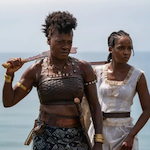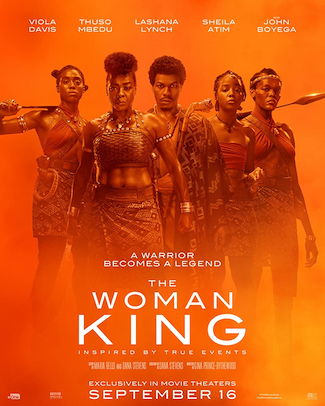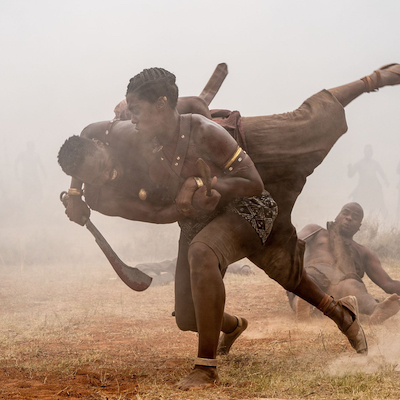 THE WOMAN KING has an irresistible hook that made it a hit: Did you know there was an all-female military regiment in 1800s West Africa, “THE MOST EXCEPTIONAL FEMALE WARRIORS TO EVER LIVE”? Now that you do, wouldn’t you like to see them kicking ass on screen, fighting off the invading “Europeens,” with Academy Award winner Viola Davis as their badass leader?
THE WOMAN KING has an irresistible hook that made it a hit: Did you know there was an all-female military regiment in 1800s West Africa, “THE MOST EXCEPTIONAL FEMALE WARRIORS TO EVER LIVE”? Now that you do, wouldn’t you like to see them kicking ass on screen, fighting off the invading “Europeens,” with Academy Award winner Viola Davis as their badass leader?
For me the answers to those questions were no, I don’t think I did, and yes, of course I would. I meant to see it in theaters, but I missed it. Reviews were mostly positive, but I remember them seeming a little subdued. Maybe I misread them, or maybe they wanted it to seem more like a Very Important awards season type movie to really get behind it. I think it has plenty of substance to it, but director Gina Prince-Bythewood (THE OLD GUARD) doesn’t treat that like the main attraction, and she shouldn’t have to. There’s a precedent for crowd-pleasing historical action dramas winning best picture, but BRAVEHEART and GLADIATOR could pass for highfalutin without having to address any issues, you know? They just had to make a rousing speech about bravery and killing a motherfucker, nobody expected them to say something deep about the world’s problems.
I actually think THE WOMAN KING does do that, but not in the way people might’ve been looking for. It’s not some neatly delivered message, but it’s there for you to contemplate beneath the surface of a slick, involving Hollywood entertainment.
 Of course part of the attraction is that the story requires a stacked ensemble cast of physically powerful Black women, which you don’t see every day. And it has a great, layered character for Davis (WIDOWS) to sink her teeth into, which she does seem to do every day, but this time she gets to do it while swinging swords, flying through the air, and menacing everybody with her shoulders as much as with her eyes and words. It’s wonderful.
Of course part of the attraction is that the story requires a stacked ensemble cast of physically powerful Black women, which you don’t see every day. And it has a great, layered character for Davis (WIDOWS) to sink her teeth into, which she does seem to do every day, but this time she gets to do it while swinging swords, flying through the air, and menacing everybody with her shoulders as much as with her eyes and words. It’s wonderful.
Set in 1823 in the kingdom of Dahomey, Davis plays the fictional General Nanisca, leader of the real life regiment the Agojie (also called the Dahomey Mino or, by white people, Dahomey Amazons). In the opening scene they attack a camp of (male) slavers from the Oyo Empire, a powerful state they’ve recently started to rebel against. These women rise out of the bushes like cobras, and I believed those big tough guys really would be terrified by it. The Agojie win the day, rescue a bunch of abducted women, and return home as heroes, strutting proudly past a line of awe-struck citizens who are forbidden from looking at them. I suspect the cast had a really good movement coach, because the precision of the posture and body language in this movie is off the charts.
The camera particularly focuses on two of Nanisca’s lieutenants, the tall, lanky Amenza (Sheila Atim, BRUISED, DOCTOR STRANGE PRESENTS THE MULTIVERSE OF MADNESS, PINOCCHIO [Zemeckis version]), and the swaggering Izogie (Lashana Lynch, CAPTAIN MARVEL, NO TIME TO DIE). Lynch’s screen presence is practically nuclear; she gives off the air of a superstar athlete, and one who’s good with the fans, judging by the way she runs over and smiles at a kid sneaking a peak at them through his fingers. As a bonus she has a cool gimmick – long fingernails that she uses like claws, refashioning a symbol of femininity into a weapon.
One of the civilians, a young woman named Nawi (Thuso Mbedu, The Underground Railroad), gets into trouble with her family by rejecting (and then punching) the rich older man they try to marry her to. Fed up with her standing up for herself, her dad drags her to the palace as a “gift” for King Ghezo (John Boyega, ATTACK THE BLOCK, playing the only character based on a real historical person). Izogie is at the gate, and she walks Newi right into the compound where only women are allowed. It seems to me Nawi’s attitude gradually goes from “What have I done?” to “I’ve got a golden ticket!” as she gets a tour of the place and realizes what her life is about to become.
(Note: This is reportedly a real thing that happened – fathers giving their daughters to the king, and them being turned into soldiers. That’s terrible, and also good riddance, Dad, you suck.)
We get lots of badass training, testing and tough-lady cold-hearted warrior philosophizing. Also jogging and some dancing. (We never see them rehearsing this, but they have some songs they play together.) Izogie is a good mentor and friend, intimidating but ultimately very supportive. Nanisca is a tougher coach. Catching Nawi grumbling about rope-tying lessons she embarrasses her by handing her a sword and having her discover in front of her fellow trainees that chopping a dummy’s head off is harder than it looks. (It’s so satisfying later when COOL SHIT SPOILER we see her in a battle swinging a sword tied to a rope. Weird that we got this and PREY in the same year!)
There’s a bit of a forbidden romance angle. Portuguese slave trader Santo Ferreira (Hero Fiennes Tiffin, nephew of Ralph and Joseph) comes to meet with the king and he brings his friend Malik (Jordan Bolger, TOM & JERRY, The Book of Boba Fett) to see the place, because Malik’s mother was a slave from Dahomey. It is standard practice in Dahomey and Oyo to sell off captured enemies as slaves, and thankfully Malik seems troubled seeing people in cages, though he remains sadly forgiving of his buddy’s involvement, saying they grew up together. I like that they chose hunky guys to play these characters. They didn’t feel the need to make Santo a weasel to underline that we should hate him. They know we get it.
Anyway, Nawi sees Malik while he’s bathing, later the dork waves at her during a ceremony, they develop a bit of a relationship, and learn some things from each other. (I don’t mean that in a suggestive way. You know how movies are these days. And this is PG-13.)
Amenza seems to be Nanisca’s partner, which brings up implications that becoming a warrior might be a “safe” way to be a lesbian. Other’s may prefer the lifestyle due to past mistreatment by men. For Nanisca it might be both. There’s some backstory-related complications that at first seem a little convenient, but serve to create some good, mythical drama. A traumatic incident in the past ties Nanisca to Nawi and gives them reason for personal animosity toward Oyo general Oba Ade (Jimmy Odukoya, CRAZY GRANNIES).
I like that Boyega doesn’t look like he got a super hero trainer to buff him up to compete with the other men in the movie. He looks very slim and clean, in stark contrast to the burly, bushy-bearded athletes of the Oyo Empire, and it doesn’t faze him. He’s confident in his power and his female bodyguards.
 The action is better than I expect from big non-87Eleven Hollywood movies, incorporating interesting fighting styles, a variety of weapons, some cool speed-ramped leaps and acrobatic wrestling moves. I appreciate all the spinning of spears and the contrasting of different body types. Credited fight coordinators are Filip Ciprian Florian (MONSTER HUNTER), Johnny Gao (assistant fight coordinator from THE OLD GUARD), Daniel Hernandez (NEVER BACK DOWN) and Stuart Williamson (Tom Hardy stunt double on FURY ROAD). Davis’ stunt double and trainer is Jénel Stevens, who among other things was a Dorae Milaje in BLACK PANTHER.
The action is better than I expect from big non-87Eleven Hollywood movies, incorporating interesting fighting styles, a variety of weapons, some cool speed-ramped leaps and acrobatic wrestling moves. I appreciate all the spinning of spears and the contrasting of different body types. Credited fight coordinators are Filip Ciprian Florian (MONSTER HUNTER), Johnny Gao (assistant fight coordinator from THE OLD GUARD), Daniel Hernandez (NEVER BACK DOWN) and Stuart Williamson (Tom Hardy stunt double on FURY ROAD). Davis’ stunt double and trainer is Jénel Stevens, who among other things was a Dorae Milaje in BLACK PANTHER.
Speaking of which, if you saw the trailer for this you may agree that its use of modern music (“My Power” from Beyonce’s LION KING album, rather than the actual score by the great Terence Blanchard) sure didn’t play down the BLACK PANTHER similarities. It’s impossible to avoid parallels, because the Dorae Milaje of the Black Panther comics and movies were largely inspired by the Agojie. I think that and the “BASED ON POWERFUL TRUE EVENTS” tagline got people expecting a straight forward empowerment tale, which led to controversy among people who assumed the movie would ignore that Dahomey were one of the top slave-trading kingdoms. That’s actually a major part of the plot, but the movie does do some myth-making with King Ghezo announcing an end to Dahomey involvement in the slave trade at the end. In reality he resisted that until 1852 because, like so many leaders, he was too timid to face the financial consequences of doing the right thing. And then he brought it back five years later when the palm oil industry wasn’t as profitable.
It should be noted that BRAVEHEART wasn’t required to be a historical textbook, and that some of what we think we know about King Ghezo could be tainted with western propaganda. I think as presented here he’s a character with some layers to him. He comes across as wise and thoughtful because he’ll usually deliberate and then come to what seems like the right decision in the context of the movie, like supporting Nanisca, or forgiving her for disobeying him, or choosing her for the titular leadership role over his fancy-pants wife. But even setting aside the enslaving of his enemies (if such a thing can be done), it’s mentioned that he’s so loyal to Nanisca because “she supported him during the coup.”
The coup! That was enough to make me skeptical of him. They don’t get into it, but in real life he seized power from his older brother with the help of Francisco Felix de Sousa, a Brazilian slave trader with a grudge because the brother had imprisoned him over a money dispute. Kings do nasty shit.
If this guy isn’t so great, then by extension the people who fight for him aren’t exactly pure, and to me that’s what the movie is about. I see it as one of those have/eat cake action movies that appeal to me; it takes advantage of how fun and cool great warriors are on screen while showing that warring isn’t a very cool thing to be great at. (See also: BILLY JACK, UNFORGIVEN, THE NORTHMAN). By definition, a warrior will be involved in some shit they’re not proud of, or at least shouldn’t be. Unjust wars, atrocities in even the most just war, perpetuating a cycle of violence, and a corrupt system, in this case one of enslaving human beings to trade for weapons used to kill human beings. Nanisca and the others put themselves through hell to be heroes, but also to be one of the main components of that evil system.
Of course, not being pure and super heroic doesn’t mean they’re not interesting. It truly is a rare thing in history for there to be an all-female military force, much less for them to be given high status, wealth, and involvement in policymaking. And there’s stuff in the movie, like the harrowing race through thorns, that would’ve been cool in a KICKBOXER or Shaw Brothers training montage, but in this case comes from their actual methods. Plus, it’s just fascinating to see a discipline that involves women vowing to forgo motherhood and marriage when we’re used to so many societies that view those as the main (or only) purpose for women’s lives.
That might come across as less inspirational if the movie mentioned it was because they were officially considered wives of the king, or if it addressed the subject of genital mutilation. This ain’t exactly girl power. It works better as an illustration of that idea that women proving they can do something as well as or better than men isn’t so hot if nobody should be doing that thing in the first place. So for example women being empowered to make movies is more important than women being empowered to behead people.
Some who were mad at the movie were quick to point out it was written by white ladies. Dana Stevens (FOR LOVE OF THE GAME) gets the screenplay credit, story by Maria Bello, who learned of the Agojie on a trip to Benin and saw the potential for a movie, receiving her first writing credit after acting in PAYBACK, A HISTORY OF VIOLENCE, THE MUMMY: TOMB OF THE DRAGON EMPEROR, ABDUCTION, PRISONERS, etc. It’s not my place to say who should write movies about Africans, but they brought it to a Black woman director who’d finally gained some long-overdue clout. This is only Prince-Bythewood’s sixth movie in a 22-year directing career, and it proves we’re gonna need more. She had eight years between LOVE & BASKETBALL and THE SECRET LIFE OF BEES, then six until BEYOND THE LIGHTS, and another six until THE OLD GUARD, so good for her/society finally getting one out with only a two year gap. Let’s keep that pace going.
The part of the movie that hit me most is the motif of the hard-bitten veterans opening their hearts a little from the influence of this young new recruit. During a grueling initiation race, Nawi makes it through the aforementioned barrier of thorns, but turns back to help her friend who’s stuck. Izogie doesn’t understand why Nawi would risk her place in the race, but she explains that she didn’t want to make it without her friend. Later, while escaping captivity, Izogie has a chance to escape, but goes back for Nawi. It seals her own fate, so it’s not the lesson I would like it to be. But things don’t always work out as they should, even in fiction.
At the end SPOILER EVEN THOUGH IT’S THE TITLE Nanisca becomes The Woman King, sharing the throne with King Ghezo. We’re not told what this means for her life, or how she feels about it. Is she retired from fighting? Is she unhappy about that? We see her sitting on a throne, changed out of her warrior garb into a pretty purple dress, looking bored and uncomfortable. But she’s learned something. It sounded pretty badass early in the movie when she told Nawi “To be a warrior you must kill your tears.” They even put it in the trailer. But in one of the last scenes of the movie she tearfully expresses her emotions to Nawi, and it’s an important moment in both of their lives, so that’s clearly a much better idea. To live you have to kill your warrior.


























January 21st, 2023 at 3:49 am
What! No comments? Ok, this is definitely on my to-watch list, because:
A: I’m a sucker for any period action/war epic
B: After giving us the chilling Amanda Waller, I believe it is past overdue for Viola Davis to get an Ass Kicking Lead Role. Seriously, next to Sam L Jackson and Ving Rhames, she has a 1000 yard stare that can chill blood.